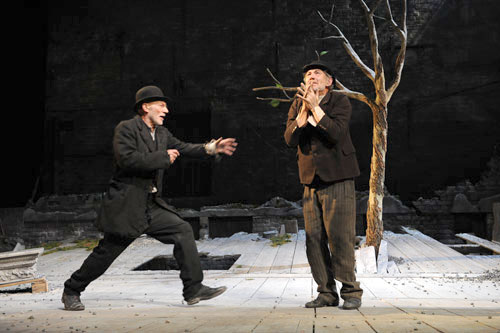When Beckett translated his own En Attendant Godot into Waiting for Godot it was an act of editing as much as anything else. Some of his changes were quite normal for a translator (the selection of the best words, the retention of the play’s themes and shape and humor) and some unique to the self-translator: reworking passages, adding phrases (a whole back-and-forth of cursing, for instance), cutting speeches. The French is riddled with rien; the English with ‘nothing.’ In one of his many amusing alterations he turns phoque (the French word for seal, which sounds like the English cuss ‘fuck’) into ‘grampus,’ which is an obscure English word for dolphin that sounds, if pronounced like a Frenchman, like a small turd.
Perhaps the most striking difference between the French and the English versions of Godot is the addition of a subtitle to the English version: ‘a tragicomedy in two acts.’ The addition is slight and certainly has not hampered the critical discourse surrounding one of the language’s most important dramatic works, but it does act as a guide through the murk. Now it’s got a genre, this strange thing, and a means of assessing it that is comfortable. At the very least, a confused patron, sitting in his seat and eyeing the stage warily, can take refuge in those words and believe that what he’s seeing shares something with late Shakespeare.
Godot is a play, of course, and plays, perhaps more so than other feats of literature, are no longer the property of the artist once the words are put to press. Beckett did not seem to mind this; indeed, in a letter to Michel Polac, director of a French avant-garde radio program that was to read selections of Godot on the air, he speaks quite candidly about the limits of his narrative authority. “I know no more about the characters than what they say, what they do, and what happens to them,” he writes. “I do not know who Godot is. I do not even know if he exists. And I do not know if they believe he does or doesn’t, those two that are waiting for him.”
The questions are thus left to his readers and the critics. And as I sat down in the Cort Theater in New York for a performance of the English version, I heard an Israeli professor tell the half dozen young men accompanying him that he wouldn’t bother to tell them what the play was about, because ‘whole books have been written about the first line.’ And then Patrick Stewart limped out, gave up again, and croaked, “Nothing to be done.” For the next two and a half hours, Stewart, as Estragon, and Ian McKellen, as Vladimir, filled up the quiet with their banter, as Vladimirs and Estragons have done countless times before (and these two have done themselves, having performed in Godot previously, in London in 2009).
The Playbill offered the usual puff piece about the main players. McKellen and Stewart have performed together not only in Beckett but also in the mutant superhero oeuvre of Bryan Singer and Brett Ratner, and all of this time together has made them good friends. The writer called it a bromance, a word that has gone from texts between teenagers to the mouths of the sort of people who can afford to pay three hundred dollars to sit slightly obscured and far away, and that—like bling and twerk and selfie before it—now wilts with overuse. Still, that word, which I read just before the curtain lifted, directed my viewing to such an extent that it almost felt like the director had added it to the marquee. McKellen and Stewart are wonderful, certainly. They say the words with verve, with clear affection for the play’s stature in the language, and they traipse around the sizable stage with the vim and vigor of two children unleashed at FAO Schwarz. But they struggle with Beckett’s silences, with the lulls he deliberately included, and the crowd laughed like they were watching Seth Rogen and Jonah Hill up there for much of it, and I fear a few lines were drowned out in the glee.
The production seemed to lack the tragic, seemed an existential buddy comedy, and as wonderful as that sounds and as good as this was, it was not the Godot I knew coming in. The waiting did not wear, the conversation never seemed to be weighted down, held aloft as it was not only by these skilled players but by their very presence. McKellen and Stewart were there, right before our eyes, and when they hugged their hugs seemed so genuine, and the awws they induced so clear, and it became apparent we were not just moved by Estragon and Vladimir, but by McKellen and Stewart doing what they loved.
Such is the problem with known performers, maybe, though McKellen and Stewart do their admirable best to be two vagrants hacking at the void with their voices and their feet. At the play’s end, having waited in vain for a second time, Estragon says what Vladimir said previously: Allons-y. And Beckett says what he said previously: they do not move. And McKellen and Stewart do that, too, but as they paused there in the lights yet to fade, I felt not the astounding burden of being alive, but the great gift of it—to watch two people try to be two others for a time and then resurface to applause that sounded like the crash of waves. Then they hugged center stage, like Beckett’s best bros.
An aside: I have always said ‘Godot’ the French way, with equal weight on both syllables. This play emphasized the ‘GOD’ in it, which seemed much too blunt to me, but also went along with the general tone of the production. A nice round-up of the matter can be read here.
Beckett’s letter translated by Edith Fournier.
Photograph by Sasha Gusov.

